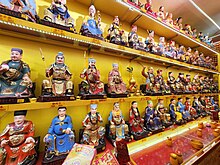You can help expand this article with text translated from the corresponding article in Chinese. (January 2012) Click [show] for important translation instructions.
|
| Tai Sui | |||||||||||||||||||||
|---|---|---|---|---|---|---|---|---|---|---|---|---|---|---|---|---|---|---|---|---|---|
| Traditional Chinese | 太歲 | ||||||||||||||||||||
| Simplified Chinese | 太岁 | ||||||||||||||||||||
| Literal meaning | great years | ||||||||||||||||||||
| |||||||||||||||||||||
Tai Sui is a Chinese name for stars directly opposite the planet Jupiter (木星 Mùxīng) in its roughly 12-year orbital cycle. Personified as deities, they are important features of Chinese astrology, Feng Shui, Taoism, and to a lesser extent Chinese Buddhism.


The 12 signs of the Chinese zodiac were based on divisions of the Jovian orbital cycle, rather than as in the western zodiac—the apparent motion of the sun relative to the celestial sphere. The star thought to oppose Jupiter during each year of the cycle was personified as a heavenly general or cycle god and was believed to help the Jade Emperor control the mortal world.
By the Warring States period, the Tai Sui had become gods in the popular astrology; but no written records have been found of their worship prior to the Han dynasty. The earliest such record is found in Wang Chong's first-century Lunheng. There are several legends related to the Tai Sui,[citation needed] usually about people suffering disaster after disrespecting or ignoring them.
Their number later quintupled to sixty based on combinations of the twelve divisions (reckoned using the earthly stems) with the five Chinese elements of fire, earth, metal, water, and wood. Each of the gods' features and attributes signifies the well-being of that year. For example, if the Tai Sui of a year holds a pen,[who?] this signifies political unrest for that particular year.[why?] On the other hand, a Tai Sui of the year who holds a spear or sword,[who?] signifies a need to work hard and excel in that year.[why?]
Yin Jiao, leader of the sixty Taisui Xingjun gods, doesn't govern any year in the 60-year cycle, and all of them were governed by one of the 60 subordinate Taisui. Yin Jiao in this context is called Taisui Tongling Yin Yuanshuai (Commander of the Tai Sui, General Yin). In Japan and Japanese folklore however, "Taisui Xingjun" is just one singular god.[1][2][3]
- ^ Akuma jiten = Dictionary of demons and devils. Atsushi Yamakita, Toshiyuki Satō, 篤 山北, 俊之 佐藤. 新紀元社. 2000. pp. 180–181, 362. ISBN 4-88317-353-4. OCLC 675723563.
{{cite book}}: CS1 maint: others (link) - ^ Nikaidō, Yoshihiro; 二階堂善弘 (2006). Dōkyō, minkan shinkō ni okeru gensuishin no hen'yō. Suita-shi: Kansai Daigaku Shuppanbu. pp. 176–180. ISBN 4-87354-435-1. OCLC 76888476.
- ^ Yüan, K'o.; 袁珂. (1999). Chūgoku shinwa densetsu daijiten. Hiroshi Suzuki, 鈴木博 (Shohan ed.). Tōkyō: Taishūkan Shoten. p. 440. ISBN 4-469-01261-0. OCLC 41554347.